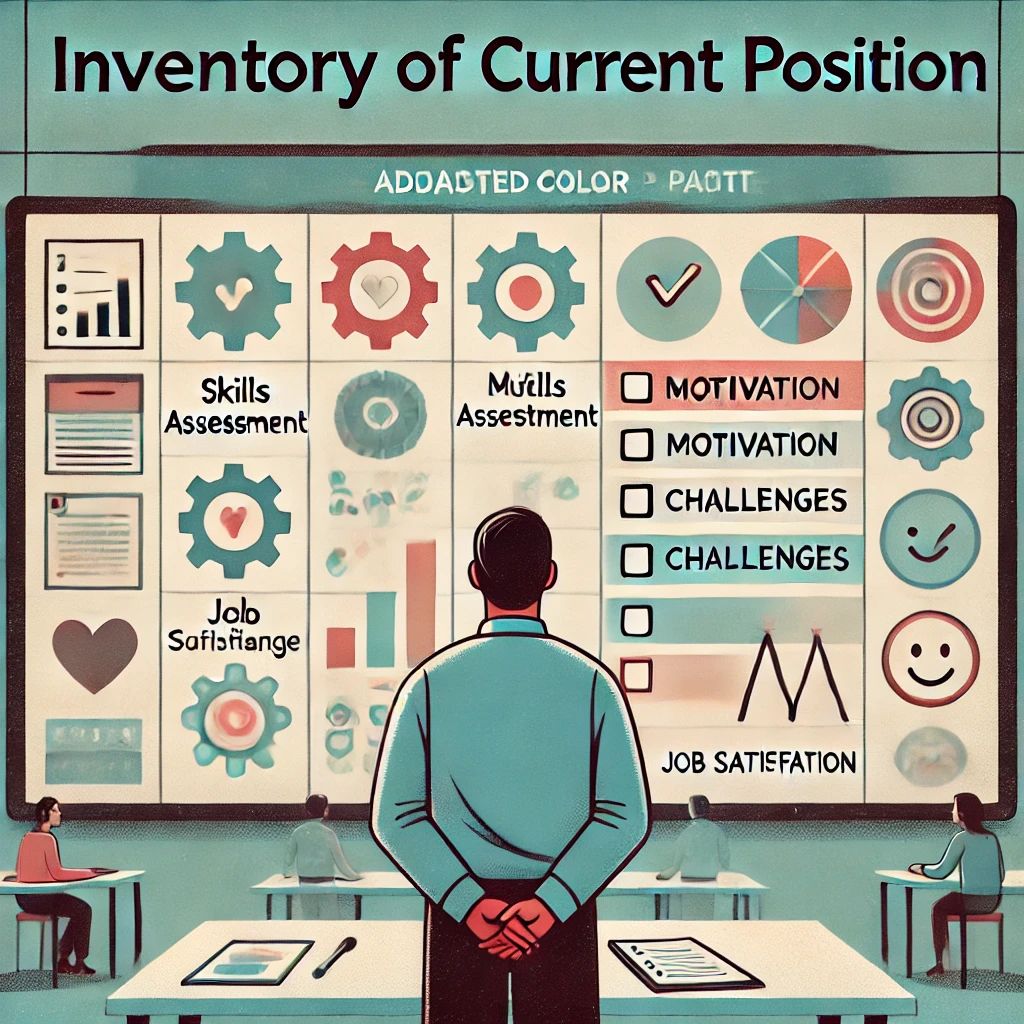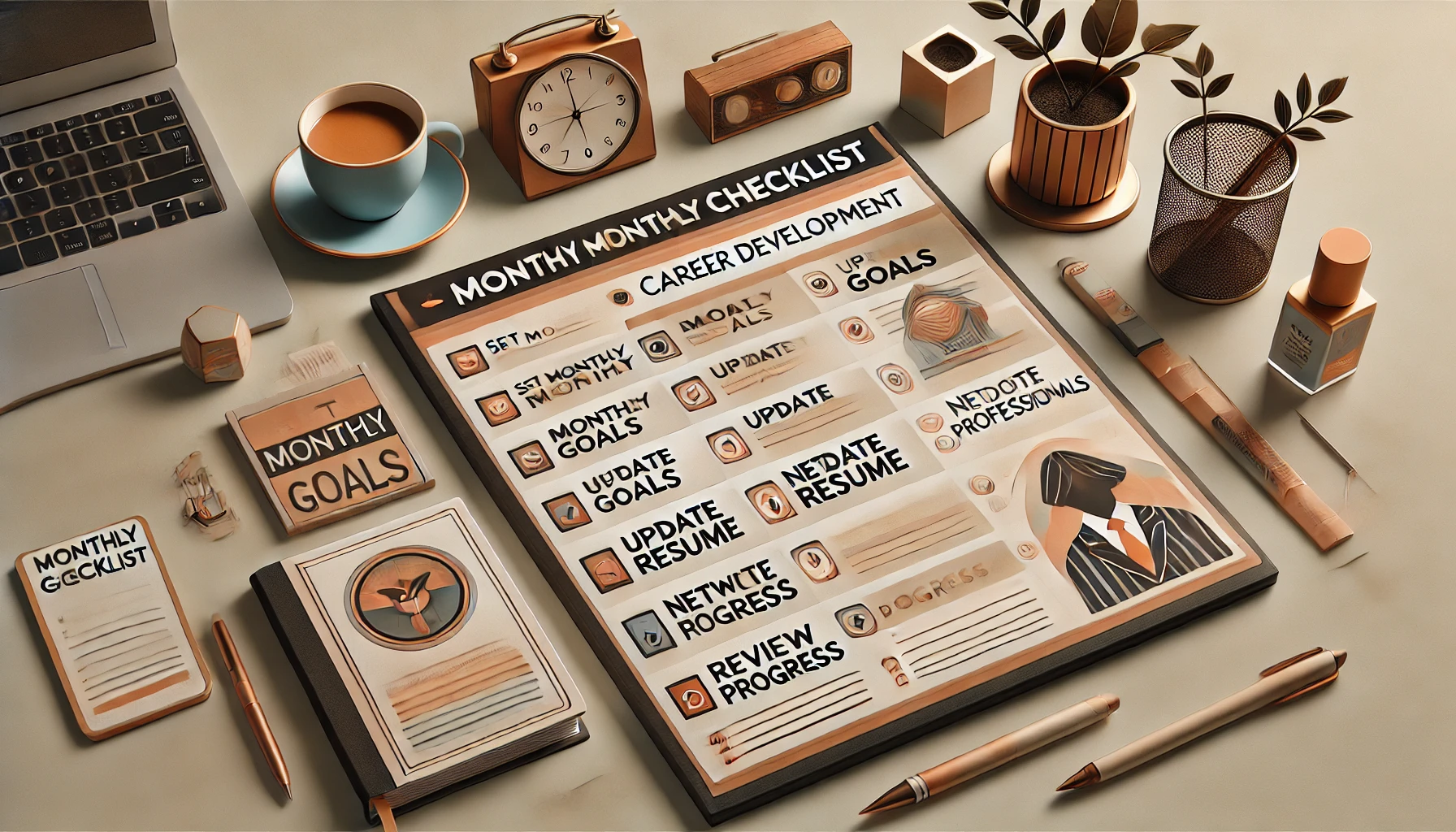Building your career and growing professionally is about making a plan and looking back on your wins. A monthly list helps you get better at what you do and aims for where you want to go. It also keeps you ready for new jobs or big changes in your career.
Having a detailed plan for your career makes you think about your job often. You celebrate reaching goals, understand what you’re good at, and see where you can improve. Learning new things keeps your career path clear and choices smart.
Updating your resume often, building a strong network, and picking clear goals are key for planning your career. This includes looking back, being happy about how far you’ve come, and changing your plans as you learn new things or have new dreams. Such steps help you stay ahead and keep growing in your job.

Also, adding must-do actions from a monthly reset list can give a boost to your career goals. Using Sundays to see how you’re doing, plan the week ahead, and relax helps you start the month right.
Introduction to Career Development
Career development is like a road map for your work life. It follows steps like trying different things, learning new skills, and climbing the ladder. Knowing these steps helps you move up in your career and learn a lot along the way.
In today’s job market, exploring career paths and improving yourself are very important. After the pandemic, many companies are focusing on teaching their employees new skills. Talking with your boss every month or every few months can help you make a plan and reach your career goals.

Focusing on your career can lead to better jobs and money. Many businesses give raises based on a percentage of what you already make. And, some new companies give you a chance to own part of the company, which can make your job even more rewarding.
Going to conferences and making new contacts can really help your career. It’s important to know a lot of people in your field. Sometimes, feeling like you’re not good enough can happen, especially in technology. Learning how to talk to others, work together, and accept advice can really help you grow in your career.
Improving yourself is really important. It’s good to know what you’re good at and what makes you special. Setting small goals that you can measure helps you keep getting better at your job.
To sum it up, working on your career in many ways is smart and effective. Looking for new skills and knowing many people can open a lot of doors for you in the future. Whether your job helps you grow or you take the lead, you shape your own path.
Reflect on Past Achievements
Looking back on what we’ve done is very important for our jobs. It helps us understand ourselves better. And this helps us make better choices in the future, making us better at what we do.

Identify Career Milestones
Highlighting important moments in our careers shows us how far we’ve come. We can see what helped us and what didn’t. This helps us celebrate our wins and learn from tough times. It also shows us the way to do better in the future.
Understand Strengths and Weaknesses
Knowing what we’re good at and where we need to improve is key. Many people say looking at themselves has helped a lot. It’s a key step in figuring out what we want to do next. And how we’re going to get there.
Evaluate Experiences from the Past Year
Checking out what we’ve done over the last year is a good idea. It lets us see what we liked and what was hard. This makes it easier to pick goals that really matter to us. And it helps spot chances to do more and be more.
Doing this often helps us map out where we’re going. We can make smart choices by thinking through our goals carefully.
Set Clear Goals
Setting clear goals is key for your career. Use the SMART criteria. This means your goals are Specific, Measurable, Achievable, Realistic, and Timely. It helps make your goals reachable and gives a good plan.
SMART Goals Framework
The SMART Goals Framework is great for setting goals. It helps you say exactly what you want. For instance, use goal-setting worksheets and the SMART Goals Mind Map. These come from a template library and give a clear picture.
To keep track, use tools like the Goal Completion Chart. Also, use a Monthly Budget Planner to watch expenses. This keeps your career plan clear and neat.
Short-term vs Long-term Goals
Know the difference between short-term and long-term goals. This helps focus on now and future goals. Try to stick to three big goals at once so you don’t get overwhelmed.
Make a 30-60-90-day plan and use a project charter template. Also, try monthly reset routines. Reflect on your wins and losses each month. This, along with digital decluttering, boosts how much you achieve.
Create “White Space” Time for Reflection
Having ‘white space’—time with no distractions—is key for thinking about your career. Experts say taking time to just think can give you new ideas. It can also help you grow personally and in your job.

Importance of Mental Space
It’s really important to take time to think about your career. Setting aside time every week for deep thought helps you grow at work. The Get To Work Book is great for this, it helps you plan your days and weeks, leaving space for thinking and tracking your habits.
Strategies to Carve Out Reflective Time
Adding ‘white space’ to your schedule is a big plus. The Simplified Planner by Emily Ley is a great tool. It makes room for that important thinking time. It’s also smart to clear out both your work area and your digital space. This keeps your mind clear. Planners like the Passion Planner or Erin Condren’s LifePlanner are also useful. They help you set clear boundaries for time to reflect.
Inventory of Current Position
Taking stock of where you are in your job is very important. You look at your skills, what drives you, and the hurdles you face. By looking at how happy you are and how well you do at work, it helps you aim better.

Assess Professional Skills
First, figure out what you’re good at and where you can get better. Knowing your strengths and weaknesses helps you get ahead. Also, keep learning new skills to keep up in your job.
Understand Motivations and Challenges
Figure out what gets you going at work. Knowing what you truly care about makes work more fulfilling. It’s also good to know what you find hard, so you can work on those things.
Evaluate Career Objectives
Think about where you want your job to go. Compare your dreams with how things are going. Make goals that make sense for you, for a career that keeps you happy and moving forward.
Identify Growth Opportunities
Finding ways to grow in your career is very important. You can develop by getting new certifications, having good mentors, and looking at new career areas. This can really boost your chances in the job market.
Upskilling and Certification
Having just one degree may not be enough for your whole working life now. People often get certifications to learn more. These can help you stand out. For instance, you might want to get certified in project management by PMI or cloud services by AWS.
Networking and Mentorship
It’s key to know many people and have a strong support system for switching careers or growing in your current one. Mentorship is great for advice and support. Also, making real connections with people can lead to new job chances. Mentors give tips on how to get over tough spots and are very valuable.

Exploring New Career Paths
New jobs might open up by looking at different areas. Trying something new often leads to good outcomes. This could mean shifting to a related job or something completely different. Using tools like informational interviews and websites can really help you explore your options.
Monthly Checklist for Career Development
Adding a career checklist to your month is key for growing your career. It helps you stay focused on your goals. This way, you build a clear path for getting better at what you do.

Looking back on what you’ve achieved can show you how far you’ve come. It’s proven that taking time to think and adjust your job strategy helps. It makes you better at facing new job trends.
It’s very important to set clear goals. Many people, about 65%, struggle to set and keep goals. Making clear goals each month makes you feel good and helps your career move forward. It tracks where you want to go.
Networking is still a big part of career growth. Making new connections each month can lead to new chances. Around 75% of people see networking as a key step in their career plan. It shows how important it is for your job life.
Don’t forget about managing your money. A big 92% think keeping track of their finances is crucial. Doing this monthly keeps you ready for future financial chances.
Finally, be proud of even the smallest wins. Celebrating your success, no matter how small, is good for your spirit. It keeps you going in the right direction for your job growth.
Refresh Your Resume
Always update your resume to be ready for new chances. In today’s job world, having a fresh resume is key. It shows recent career aims, duties, and wins. Keeping your resume current makes your online profile more attractive. Employers like to see active professionals.

Updating Career Objectives
It’s vital to align your resume with what you want now. Half of people only update their resumes when job hunting. It’s smart to refresh your resume once a year. A clear job title and summary can make your resume shine and beat the computer checks most companies do.
Documenting New Responsibilities
Showcase your growth and skills by adding new work duties. Use numbers and facts to stand out. For example, say “Managed a training program” instead of “Set up a program that cut turnover by 70%.” Updating this section often makes your resume look up-to-date and professional.
LinkedIn Profile and Online Presence
Optimizing your LinkedIn is crucial for online branding. It boosts your chance of being seen by job experts. To do this, update your headline, summary, job history, and skills. CORE LinkedIn Optimization can help with these parts. FULL Optimization looks at your whole profile. Regular tweaks keep your presence strong.
Expand Your Professional Network
Getting to know more people in your field helps your career grow. It means you can get advice, learn new things, and find jobs. Focus on making connections, going to events, and using social media to build a strong network. This network can really help you move forward in your career.
Building Connections within the Industry
Making friends in your line of work is key. Talk with your coworkers, bosses, and industry big shots. They can offer different points of view and joint projects. Platforms like LinkedIn are perfect for growing your network. They give you many chances to meet new people and companies.
Engaging in Networking Events
Events made for connecting are great for meeting new people. Most people think they’re important for getting ahead in your job. Going to events for your line of work, events by your school, and meetings with other pros lets you swap contacts and have deep chats. This often leads to hearing about jobs before they’re even listed.

Utilizing Social Media
Using social media smartly is a big deal for your career. Platforms like LinkedIn are awesome for boosting how others see you. You should update your online profile, answer messages, chat with your contacts, and add new friends every day. Some things, like checking your stats and joining online talks with pros, are good to do each month. Setting aside just a little time daily for this can really help your network grow.
Keeping up with social media keeps your work connections strong. It also helps you to know what’s hot and new in your field. Doing social media right keeps you visible and well-known in your industry.
Track Milestones and Celebrate Successes
Tracking your career milestones helps you grow. Keep an achievements log to watch your progress. This lets you ensure you meet your goals and celebrate every win. Looking back at what you’ve achieved improves and motivates you.
Keeping a Log of Achievements
Using an achievements log is like your own career diary. It shows off the big moments in your career. Say you finished a huge project or got a promotion; these things keep you moving forward.
Regular Self-Assessment
Checking in with yourself often is key to doing well at work. It helps you see what you’ve done and where you can do better. With this info, you can focus on what matters for your job. It also helps you decide how to grow in your career.
Rewarding Progress
Celebrating your wins keeps you going strong. Getting small rewards for your hard work feels good. For example, finishing a report or a big step in a project. This makes you want to keep getting better at your job. Using milestone templates makes marking these moments fun and easy.
Adapt and Revisit Career Plan Regularly
In today’s fast-moving work world, being flexible with your career plan is key. It’s important to update your goals regularly. This lets your career path match your changing dreams and what the job market needs.
Flexible Approach to Career Planning
Being open to change is crucial in career planning. Try to stay fluid with your career goals. Use self-assessment tools and listen to advice from others. These can help you make smart changes to your goals and deal with life’s twists.
Review Every Six Months
It’s important to check in on your career plan every six months. People can feel unsatisfied with their jobs at different times. Keeping an eye on your goals helps you make sure they still fit. Using a SWOT analysis can spot areas for growth and change.
Adjusting Goals as Needed
Updating your goals is a big part of keeping your career plans alive. Make sure your goals are clear and match your long-term dreams. Checking and changing them regularly allows you to grab new chances and keep going. A career coach can also offer good advice and support.
Conclusion
A monthly checklist is key for growing in your career. Keeping it up to date and checking in often helps you get better at what you do. This method makes work easier, cuts down on mistakes, and keeps everything running smoothly.
Setting goals and checking them off as you go is also vital. It gives you a roadmap to success and keeps your plans fresh. With this kind of care, managing money and getting ready for check-ups is a breeze.
Also, using tech for boring jobs makes things go quicker at the end of the month. It helps with money checks and getting your bills in order. Doing this work well boosts your chances of future success. Tools like Xenett software make these tasks faster and smarter. So, you’ll be on track with your big career dreams in no time.
FAQ
What is a monthly checklist for career development?
A monthly checklist helps you stay on top of your career goals. It focuses on self-assessment, setting goals, improving skills, and networking. This keeps you ready for new job chances and helps achieve your career dreams.
How does reflecting on past achievements benefit my career?
Looking back at what you’ve achieved helps identify important career steps. It lets you see what you’re good at and what you need to improve. This guides your future goals and steps to grow in your career.
What are SMART goals and why are they important in career development?
SMART goals are Specific, Measurable, Achievable, Realistic, and Timely. They are clear and help you set steps to reach bigger career goals. These goals ensure you make progress in your career.
Why is ‘white space’ time crucial for career development?
Having time with no distractions allows for thinking deeply about your career. It can bring new insights and help you grow both personally and professionally.
How can I assess my current professional skills and career position?
To know where you stand, look at your skills, what keeps you happy at work, and the problems you face. This helps see if you’re advancing in your job or field.
What growth opportunities should I consider for career advancement?
For advancing your career, think about getting more skills, finding mentors, and looking at new career paths. Using career help can also boost your professional growth.
How often should I update my resume?
It’s important to update your resume regularly for new job chances. Update your goals, list new tasks, and make your LinkedIn strong. This helps you be seen online.
What are effective ways to expand my professional network?
Grow your network by meeting new people in your field, joining events, and using LinkedIn. These steps can lead to useful advice, tips, and maybe new jobs.
How can I effectively track my career milestones and celebrate successes?
Record your wins and check on your career progress. Celebrate every win, big or small, to stay motivated. This encourages you to keep aiming for your goals.
How often should I revisit my career plan and adjust my goals?
Keep reviewing and updating your career plan to match changes in your life and job world. It’s good to look at your plan and goals every six months or so.

More Posts
Top strategies for Improving Business Productivity
A successful business achieves maximum profit with minimum resource investment. Business owners understand that maximizing productivity is the best way to accomplish this goal. Workforce, workplace environment, culture, and routines influence business performance....
11 Time Management Tips for Working Moms
Working moms have to manage many roles. This includes being a mom, working, and handling the home. It can be hard to find balance, but it’s possible. Summer Owens, for example, handled graduate...
9 Book Reading Hacks to Follow This Month
Are you into books and want to read more often? By using smart strategies, we can go from reading once in a while to finishing 50-75 books in a year. This month, we’re...
10 Must-Try Online Calendar Planners for Effective Time Management
In the era of digitization and hustle culture, efficient time management is not just a choice but a necessity. Amid the avalanche of tasks, appointments, and commitments, you need a dependable ally to...